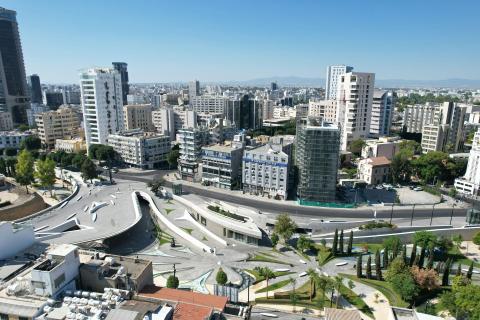European Economic
and Social Committee
EESC puts water resilience at the heart of Europe’s future in Cyprus
Water resilience was the focus as the European Economic and Social Committee (EESC) met in Nicosia for its Extraordinary Bureau Meeting under the incoming Cypriot Presidency of the Council of the EU. Civil society representatives, experts and policy makers examined Europe’s water challenges and explored coordinated solutions.
President of the Republic of Cyprus, Nikos Christodoulides, described water security as 'one of the defining challenges for Europe, and particularly for Cyprus.' He framed the Presidency as 'a journey founded on responsibility, cooperation and a commitment to ensuring that no citizen and no region is left behind.' Highlighting the strain on Cyprus’s water systems, he added: 'Water resilience is not an abstract concept for us; it is a daily reality. We must act together to secure a sustainable and peaceful future for our societies.'
EESC President Séamus Boland stressed water’s strategic role in Europe’s social, economic, and environmental security. Nearly ten million Europeans still struggle to access drinking water. 'Water is not just what we drink; it is the foundation of our food systems, our industries, our energy security and, increasingly, our peace and stability,' he said. 'We look forward to working with the Cypriot EU Council Presidency on this and other important topics including housing, migration, energy connectivity and competitiveness.'
Rising inequalities and climate pressures
Mr. Alain Coheur, chairman of the EESC's Industrial Change Commission, reviewed developments since the EESC adopted its water declaration three years ago, noting rising inequalities, ecosystem pressures, and climate impacts. He called for major investment in infrastructure, stronger coordination among Member States, and a clear distinction between the EU’s Green Deal and the emerging Blue Deal. 'We need a coherent water resilience policy that ensures equal access, strengthens preparedness for future crises, and supports innovation across all sectors,' he said.
Cyprus’s acute vulnerabilities
Professor Fadi Comair of the Cyprus Institute highlighted the island’s vulnerabilities: a 14% drop in rainfall since 1901, declining dam storage, and a tourist population three times the local population. Heavy reliance on dams and desalination makes Cyprus fragile. Comair warned that water scarcity risks social instability and stressed the need for regional water diplomacy and research into efficient desalination and irrigation systems.
The economic and industrial weight of water
Durk Krol, Executive Director of Water Europe, called water 'a finite, local and shared resource used across more than 70,000 utilities in Europe.' He outlined five key innovation areas to achieve a Water-Smart Society, including circular water systems, digital water, and climate-resilient infrastructure, and highlighted Europe’s water-intensive industries, from cooling data centres to producing green hydrogen.
Mr. Krol identified four action pillars: invest in ageing and climate-vulnerable systems; enforce water legislation; embrace innovation and digitalisation; and adopt a cross-sectoral approach linking water to energy, food, and industry. He called for €300 billion in the next Multiannual Financial Framework to upgrade infrastructure, deploy smart solutions, and ensure preparedness. 'Every €1 invested in water can generate €2.3 in economic returns, and each €1 billion creates up to 16,000 jobs,' he said.
Human impact and preparedness
Mr. Coheur recalled catastrophic flooding in his region three years ago, which destroyed homes and infrastructure. 'It looked like a war zone. Preparedness is not optional,' he said. Speakers agreed that Europe’s water transition requires technology, innovation, pragmatic management, and cooperation between civil society, experts, and policymakers.
The Bureau Meeting concluded with a joint commitment to make water resilience central to Europe’s future. The EESC will continue working with EU institutions on the Roadmap for Water and support the Commission’s Water Resilience Strategy as a cornerstone of the EU’s Blue Deal.
